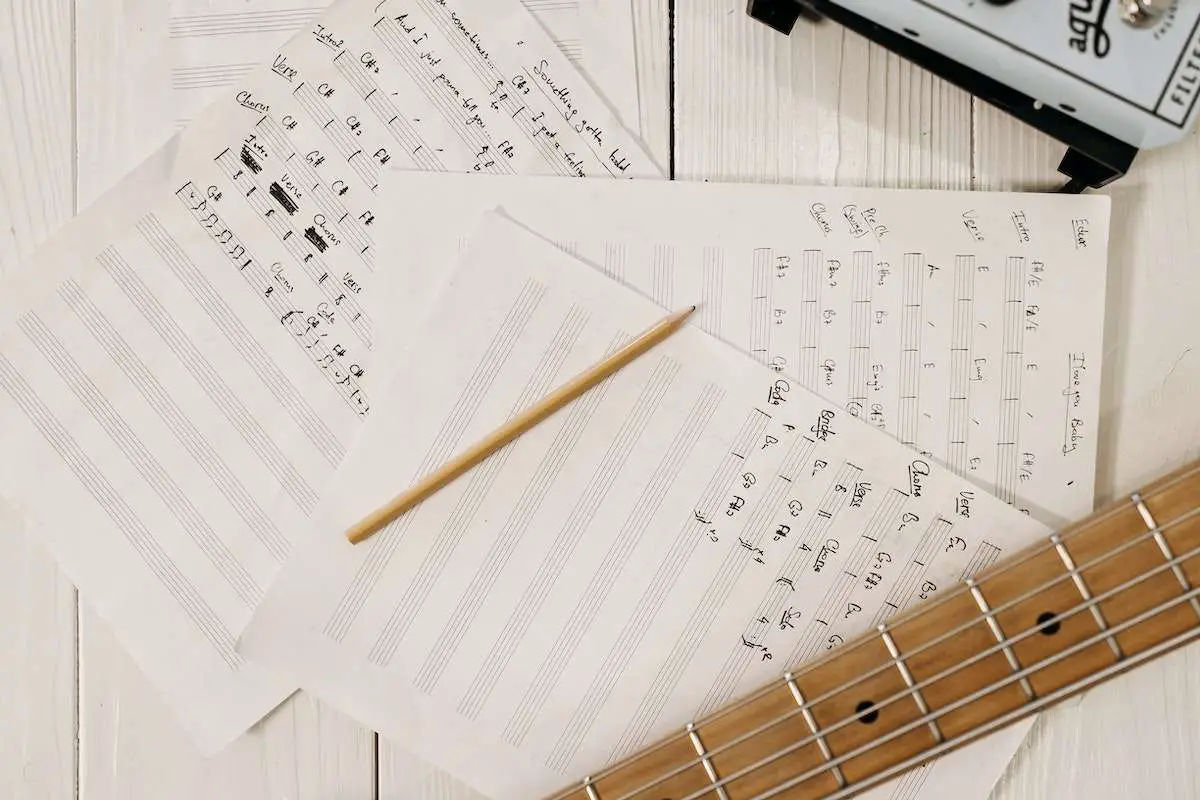Over the years, many musicians have developed a stigma against learning music theory. Common reasons are that music theory “diminishes creativity” or that it must not be necessary because their favorite musician doesn’t know it. This article focuses on why music theory is important for understanding and creating music.
Music theory provides a set of guidelines, allowing us to communicate our ideas effectively and create music that is both pleasing to the ear and emotionally impactful. Learning music theory can help you become a better musician by giving you a deeper understanding of the music you play and the tools you can use to create it.
Music theory also provides a common language for musicians to communicate with each other. When musicians learn music theory, they can use this knowledge to communicate their ideas more effectively and collaborate more easily. Whether you’re playing in a band, composing music for a film, or just jamming with friends, understanding music theory can help you work together more effectively and create music that is more cohesive and enjoyable.
By understanding the rules of harmony, melody, rhythm, and form, you can express yourself more effectively through music. Lastly, understanding music theory can help you appreciate and enjoy music on a deeper level.

Music Theory Basics
Music theory is the language of music. It is the study of how music works, including the elements and structure of music. Understanding the basics of music theory can help you become a better musician, whether you are a performer, composer, or music enthusiast.
At the heart of music theory are notes and keys. Notes are the building blocks of music, and they are represented by symbols on a musical staff. Keys are the collection of notes that make up a particular scale or tonality. Each key has its own unique sound and feeling, and understanding how keys work is essential to understanding music.
When it comes to playing an instrument, understanding the basics of music theory can help you develop your skills. For example, understanding rhythm can help you keep a steady beat and play in time with other musicians. Understanding pitch can help you play in tune, and understanding harmony can help you play chords and create interesting musical textures.
Music theory also provides a framework for understanding the structure of music. The elements of music, such as melody, harmony, and rhythm, are the building blocks of musical structure. Understanding these elements and how they work together can help you analyze and appreciate music more deeply.

Understanding and Applying Music Theory
With a solid understanding of theory, you can read sheet music, perform, improvise, and create your own music.
Music theory is not just a set of rules and concepts that you need to follow. It is a practical tool that you can use to improve your playing, express yourself better, and communicate with other musicians.
Music theory also teaches you how to read sheet music. Sheet music is a written representation of music, and it is essential for musicians to be able to read it. With a solid understanding of music notation, you can read sheet music, which allows you to perform music accurately and expressively.
Ear training and sight-reading are also important aspects of music theory. Ear training helps you develop your ability to recognize and identify different sounds, which is essential for creating music. Sight-reading helps you develop your ability to read sheet music quickly and accurately, which is essential for performing music.
Finally, music theory teaches you how to improvise and create music. Improvisation is the art of creating music on the spot, and it is an essential skill for any musician. With a solid understanding of music theory, you can improvise confidently and creatively, which allows you to express yourself fully as a musician.
The Influence of Music Theory on Various Genres
Music theory has played a significant role in shaping various genres of music. From classical music to modern-day bands, the principles of music theory have been applied to create beautiful melodies, harmonies, and rhythms. Here are some examples of how music theory has influenced different genres:
Classical Music
Classical music is one of the most prominent genres that rely heavily on music theory. The principles of music theory are used to create complex and intricate compositions that are both beautiful and challenging to play. The use of counterpoint, harmony, and melody are some of the essential elements of classical music that are derived from music theory.
Jazz
Jazz is another genre that has been heavily influenced by music theory. The use of complex chord progressions, improvisation, and syncopation are some of the essential elements of jazz that are derived from music theory. Jazz musicians use their knowledge of music theory to create unique and innovative sounds that are both challenging and enjoyable to listen to.
Rock
Rock music is a genre that has been heavily influenced by classical music and music theory. The use of power chords, scales, and modes are some of the essential elements of rock music that are derived from music theory. Bands such as Led Zeppelin, Pink Floyd, and The Beatles used their knowledge of music theory to create some of the most iconic and memorable songs in rock history.
Band
Music theory plays a crucial role in the success of a band. It allows band members to communicate and collaborate effectively, which is essential in creating beautiful and cohesive music. Band members use music theory to understand the structure of a song, the key, and the chords used, which helps them to create a unique and memorable sound.
Practical Benefits of Learning Music Theory
Learning music theory has many practical benefits that can enhance your musical experience and improve your skills as a musician. Here are some of the most important practical benefits of learning music theory:
Key Signatures
One of the most practical benefits of learning music theory is that it allows you to understand key signatures. Key signatures are important because they tell you which notes to play and which notes to avoid when playing a piece of music in a certain key. By understanding key signatures, you can play music more accurately and with greater precision.
MIDI
Another practical benefit of learning music theory is that it allows you to work with MIDI. MIDI is a digital protocol that allows you to create and manipulate musical data on a computer. By understanding music theory, you can work with MIDI more effectively and create more complex and interesting music.
Possibilities
Learning music theory also opens up many new possibilities for creating amazing music. By understanding the underlying principles of music, you can experiment with new chord progressions, melodies, and rhythms, and create music that is truly unique and original.
Enjoyment
Learning music theory can also enhance your enjoyment of music. By understanding the structure and form of music, you can appreciate it on a deeper level and gain a greater appreciation for the artistry and creativity that goes into creating great music.
Development and Growth
Learning music theory is also an important part of your development and growth as a musician. By studying music theory, you can improve your technical skills, develop your creativity, and expand your musical horizons.
Emotional and Academic Benefits
In addition to the practical benefits, learning music theory can also have emotional and academic benefits. By studying music theory, you can develop a greater sense of discipline and focus, and improve your ability to think critically and analytically.
Learning Process
Finally, learning music theory can also improve your overall learning process. By studying music theory, you can develop better study habits, improve your memory and retention, and become a more effective learner in general.
Psychological Benefits of Learning Music Theory
Music is an essential aspect of human life, and it has a profound impact on our social and psychological well-being. Understanding music theory is crucial for anyone who wants to appreciate music at a deeper level. Here are some ways that music theory can affect you socially and psychologically:
Social Impact
Music has the power to bring people together and create a sense of community. By understanding music theory, you can participate in musical activities with others, such as singing in a choir, playing in a band, or attending concerts. These activities can help you build relationships with others who share your love of music.
Music theory also plays a crucial role in the music industry. Musicians who understand music theory can communicate more effectively with other musicians, producers, and engineers. This can lead to better collaborations and more successful musical projects.
Related: Are Electric Guitar Strings Easier To Press?
Psychological Impact
Music has a profound impact on our emotions. By understanding music theory, you can appreciate the emotional elements of music more fully. For example, you can recognize the use of minor keys to convey sadness or the use of major keys to convey happiness. This understanding can help you connect with music on a deeper level and experience its emotional impact more fully.
Music theory can also help with expression and improvisation. By understanding the elements of music, you can create your own music and express yourself in new and exciting ways. This can be a powerful tool for personal growth and self-expression.
Related: Why Are Martin Guitars Expensive?
Child Development
Music theory is also essential for child development. Children who learn music theory at a young age develop better cognitive skills, such as memory, attention, and spatial reasoning. They also develop better social skills, such as teamwork, communication, and empathy. By understanding music theory, children can develop a lifelong appreciation for music and its many benefits.
Related: What Does SG Stand For?
